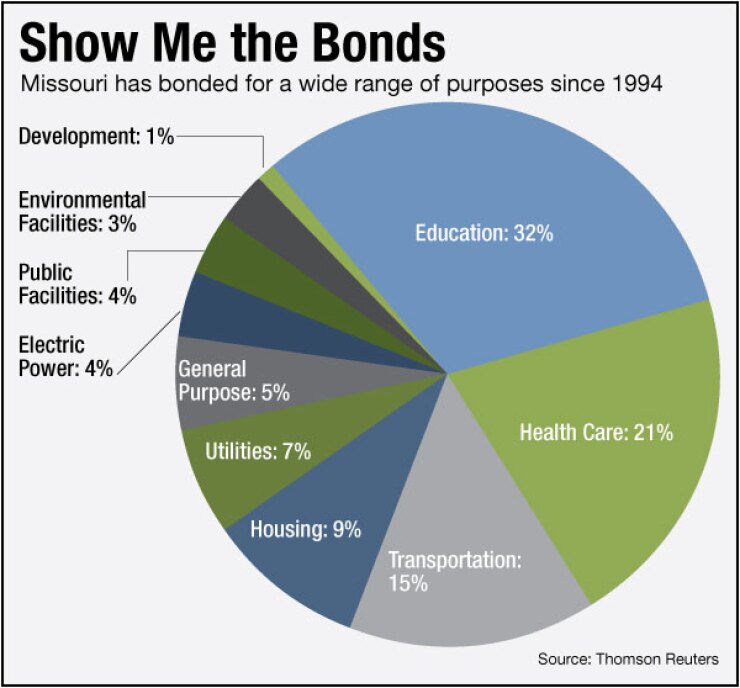
CHICAGO - Missouri is readying a roughly $90 million appropriation-backed refunding next month as it develops plans for a rare new money issue next year to raise $200 million for a new mental health facility.
The refunding will sell competitively with the Board of Public Buildings serving as issuer, according to Stacy Neal, director of accounting in the state's office of administration. The state carries triple-A ratings on its rare general obligation bonds and high double-A ratings on its appropriation debt.
"We expect present value savings on the refunding of the 2006 bonds to total about $12 million," Neal said. Columbia Capital Management is advising the state and Gilmore & Bell PC is disclosure and bond counsel.
The new money borrowing to finance a replacement for the aging Fulton State Mental Health hospital as proposed by Gov. Jay Nixon was included in the fiscal 2015 budget along with another $600 million in additional borrowing authority for state buildings and public university projects.
The $600 million authorization includes $400 million for state projects and $200 million for repairs and renovations to existing higher education facilities.
About $200 million of the $600 million, included to fund the new Fulton facility, in authority is unlikely to be tapped. The state expects instead to go forward with the separate authorization working with the Missouri Development Finance Board as funds for debt service under that authority were included in the fiscal 2015 budget. A decision is not yet final.
The 25-year bonds would be secured by an appropriation pledge. The state is looking at selling the bonds competitively in early spring 2015.
"We do have two possible paths and the decision is still pending and awaiting action by the governor," Neal said.
The state could begin to tap some of the additional authority in the next fiscal year as debt service on $141 million of the college authorization was included in the budget as well as for projects related to a business incubator/rail station in St. Louis.
The new money borrowing in the budget came after several years of legislative discussions on funding infrastructure but no action. Lawmakers also approved asking voters to approve a three-quarter cent sales tax increase targeted to raise $500 million in annual revenue for roads, bridges, ports, railroads, airports, and other transportation projects.
If voters approve it, the tax hike would take effect on Jan. 1, 2015. It would remain in place for 10 years and could be extended with another vote. Nixon set an August ballot date and recently announced his opposition over concerns that it would hit taxpayers too hard.
Lawmakers this year also passed a $26.4 billion budget and a $620 million tax cut package, dealing Nixon a blow by overriding the governor's veto of the tax cuts. Nixon is a Democrat and Republicans control the Legislature.
The legislation would gradually cut the state's top individual income tax rate to 5.5 % from 6% and phase in a 25% cut for business income. Republicans estimate the total annual cost once all pieces are phased in to be $620 million.
The tax cut would only begin to be phased in starting in 2017 if revenue collections rise by a minimum of $150 million annually from a high benchmark over the previous three years. The administration has raised concerns that the cut could actually cost the state billions annually due to language that eliminates taxes on the highest bracket.
Under the legislation, Nixon contends most residents would fall under the highest bracket, eliminating 65% of state revenue. Republicans disagree with the interpretation but any change must be approved by the end of June or it would require a public vote to correct.
Nixon recently slammed tax breaks approved in the waning hours of the session that he warned carry an annual price tag of $776 million and would lead to a budget deficit because the impact on state sales tax collections was not included.
The measures mostly impact sales tax collections and would trim state collections by $425 million and local sales taxes by $351 million, Nixon said in a statement.
"Missourians deserve an explanation for why legislators rushed through $776 million in special breaks and exemptions on the last day of session, without accounting for even a penny of these costs in the budget they sent to my desk," he said.
The tax breaks, coupled with disappointing monthly revenue figures for the current fiscal year, could trigger budget cuts or a withholding of spending.
Nixon has the ability to withhold budgeted allocations when revenues fall short of previous projections.
Another ballot measure approved by lawmakers could curtail the governor's power to alter the budget. That power is considered a credit strength.
State budget director Linda Lubbering recently reported that current fiscal year revenue through May totaled $7.32 billion, up just 0.2% over last year and in May they decreased by 3%. The fiscal year ends June 30.
Income tax collections total $5.78 billion in the current year, down 0.7% from the previous year. Sales and use tax collections are up 2% for the year to $1.77 billion. Corporate income taxes are up by 5.4% for the current year but down in May.
In a rating review last year, Moody's Investors Service said the state's credit "is based on its history of excellent financial performance and sound reserve levels, strong fiscal management controls, and the state's moderate debt burden."
Its strengths include strong executive powers to respond to revenue shortfalls, including the ability to reduce spending to below appropriated levels, budget reserves, and moderate debt levels. Its challenges include revenue raising limits imposed by the Hancock Amendment that require taxpayer rebates when revenue growth exceeds personal income growth and a lagging economic recovery.





